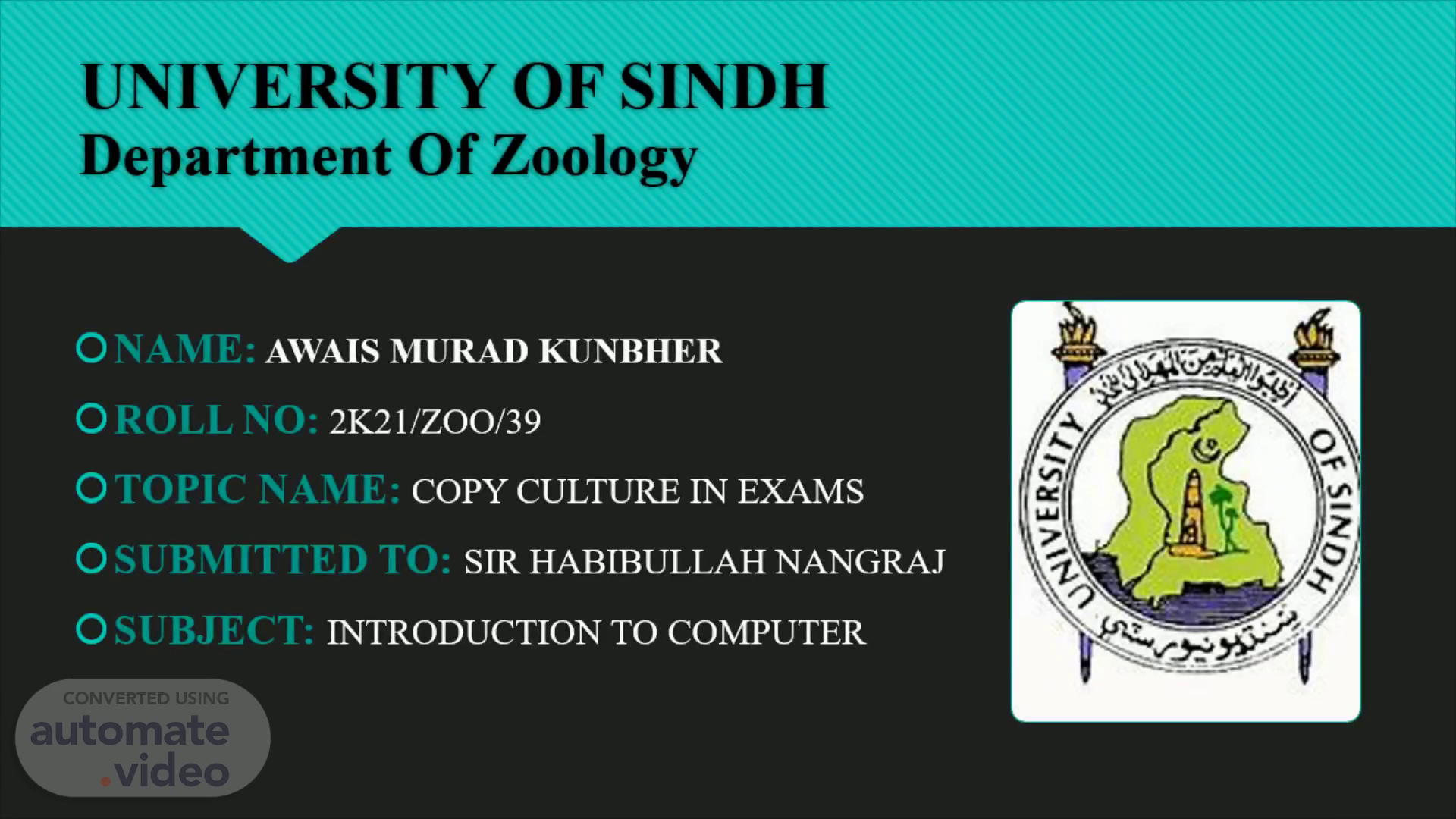
Page 1 (0s)
UNIVERSITY OF SINDH Department Of Zoology. NAME: AWAIS MURAD KUNBHER ROLL NO: 2K21/ZOO/39 TOPIC NAME: COPY CULTURE IN EXAMS SUBMITTED TO: SIR HABIBULLAH NANGRAJ SUBJECT: INTRODUCTION TO COMPUTER.
Page 2 (14s)
INTRODUCTION:-. Cheating is defined as fraud, deceit, or dishonesty in an academic assignment. It includes using or attempting to use materials, or assisting others in using materials that are prohibited or inappropriate in the context of the academic assignment in question. For example: Copying or attempting to copy from others during an exam or on an assignment Communicating answers with another person during an exam Preprogramming a calculator to contain answers or other unauthorized information for exams Using unauthorized materials, prepared answers, written notes, or concealed information during an exam.
Page 3 (2m 58s)
Percentage of students cheating in exams by Gender, Age and GPA.
Page 4 (7m 58s)
REASONS WHY CHEATING IS WRONG?. Cheating is the same as lying and stealing. Each time you hand in schoolwork, you are basically telling the teacher that you completed that work on your own. That’s either true or, if you cheated on the work, it’s lying. Cheating is also stealing because you are taking someone else’s work and calling it your own.
Page 5 (10m 21s)
Cheating causes stress. When you cheat, you inevitably worry about getting caught. The stress of getting caught increases when you consider the possible consequences of your actions, such as getting in trouble at home or receiving disciplinary actions from the school. Even worse, you may have to develop a story to cover up your cheating, which can lead to getting trapped in a web of lies because it’s so difficult to keep your story straight when it never happened. It can be very stressful if you get caught in a lie, or if you thinks someone knows about your cheating and might tell someone else..
Page 6 (12m 34s)
Cheating is unfair to others. Have you ever played a game by the rules only to have a friend who was so intent on winning that they cheated? Cheating is very frustrating when you are playing by the rules. When you cheat in school to get better grades, it’s unfair to the kids who actually studied and did the work. You may also receive unfair recognition for the better grade, when it is not deserved. Cheating is unfair to you. Accomplishment feels good and helps build self-esteem and self-confidence. When you cheat, you are basically telling yourself that you do not believe in your own abilities. You might get an A on a test or an assignment, but you’ll know that you really didn’t earn it. Cheating just makes you feel bad about yourself..
Page 7 (15m 55s)
Cheating is disrespectful. Cheating shows a lack of respect for the efforts of your teacher and your classmates who did the work. Cheating kills trust. It only takes getting caught cheating one time to ruin trust. Even if you never cheat again, those in authority will always have a hard time trusting you and will likely be suspicious of your work. When others hear about your cheating, their opinion of you will be compromised. Cheating can become a habit. People who cheat don’t usually do it one time. It becomes a habit that follows people throughout college and into their careers. Just like gambling or stealing, cheating can become a part of who you are and spread into other areas of your life. Cheaters tend to lose perspective as to what is acceptable behavior and demonstrate a disregard for others..
Page 8 (18m 33s)
Cheating eventually leads to failure. By skipping the hard work involved in learning, you will never develop the important traits of persistence, dedication, diligence, and sacrifice. Success takes hard work, and cheating is the easy way out. Eventually, you will find that it is difficult to achieve your goals without these important skills. Cheating is embarrassing. Your actions define who you are to those around you. When you cheat, you are expressing yourself to others as lazy, incompetent, untrustworthy, selfish, unintelligent, and disrespectful. In addition, many schools are developing tougher stances on cheating. Imagine your embarrassment when you are suspended for cheating or you discover that school personnel informed college admissions officers of your actions..
Page 9 (21m 5s)
SUMMARY. Cheating in exams and assignments can be attributed to many reasons. To begin with, teaching today concentrates so much on the exams and passing rather than impacting knowledge. Lack of confidence in one’s ability and societal pressure is another reason why cheating is so wide spread. Cheating cannot solely be blamed on the students; lecturers have also played their part in this. Apparently, most lectures concentrate on teaching than giving assignments during class time. This leaves the students with loads of work to cover during their free time. Technology has also played its part in cheating—many students turn to the internet in a bid to complete their assignments. On the other hand, it is important to note than choices have consequences and the repercussions of cheating in an exams are dire. First, it completely ruins one’s reputation thereby hindering chances of joining college or getting a good job. It also leads to suspensions and/or expulsion from school..
Page 10 (26m 5s)
REFERENCES :-. https://academicguides.waldenu.edu/studentaffairs/academicintegrity/cheating#:~:text=Cheating%20is%20defined%20as%20fraud,the%20academic%20assignment%20in%20question . https://www.buffalo.edu/academic-integrity/about/reasons-students-cheat.html https://www.researchgate.net/figure/Percentage-of-Students-Cheating-in-Exams-by-Gender-Age-and-GPA_tbl1_265802230 https://middleearthnj.org/2015/09/28/10-reasons-why-cheating-is-wrong/.